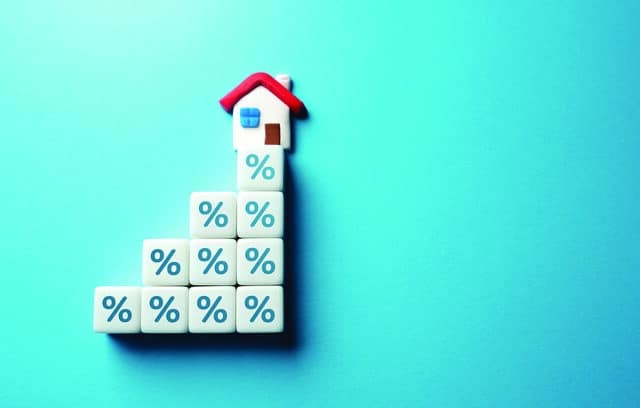
Inventory is building up across Massachusetts, and a constellation of factors is to blame. iStock illustration
This spring has seen more homes hit the market in Massachusetts than in several years, but high costs still seem to be dampening buyer demand.
According to data from The Warren Group, publisher of Banker & Tradesman, single-family home sales flattened out in April. Single-family home sales dropped by 4.2 percent on a year-to-year basis in March and by 0.6 percent in April. Alongside the drop in sales, the median price of single-family homes in Massachusetts eclipsed $600,000 in both months.
Pending sales figures paint a slightly rosier picture, according to MLS data compiled by listings portal Zillow. Greater Boston saw a 5.7 percent increase in pending sales in the same month, potentially helped by buyers regaining a little confidence as economic anxiety eased towards month’s end.
But current president of the Greater Boston Association of Realtors Mark Triglione noted that sometimes the numbers don’t paint the full picture.
“We’re certainly seeing more inventory and, we have more months of supply,” he said. “But when I talk to agents in our market area, most of the feedback that I received from people – it’s not so much that buyer demand has decreased at all. It just seems like sellers, in some cases, have really been shooting for the moon, and buyers have been kind of leveraging the gravity of the market to pull them back down to earth.”
Inventory Keeps Building Up
The number of single-family houses for sale across the state was up 8.5 percent in April, to 6,058 according to the Massachusetts Association of Realtors.
For condominiums, the increase was even bigger: 15.8 percent, with 3,732 on the market.
Brokerage and listings portal Redfin’s weekly MLS-based data tally suggests that inventory rally likely kept going last month.
The four weeks ending May 25 saw the combined number of condo and single-family listings in Greater Boston hit 8,188, up over 14 percent year-on-year. In Worcester, total inventory is up 9.47 percent to 1,602; on the Cape it’s up 20.21 percent to 1,240 listings; and in the Pioneer Valley it’s up 7.13 percent to 991 homes.
Even if these extra homes might represent opportunities for someone looking to trade up or land their first home, buyer fatigue has become a major issue, said MAR 2025 President Sarah Gustafson, the operating principal at Keller Williams Pinnacle Central and Keller Williams Pinnacle MetroWest.
Along with rising prices and costs such as increased down payment amounts, interest rates remain high compared to the 3 percent and 4 percent rates seen in the early 2020s that helped many afford rapidly escalating home prices.
And after years of highly competitive home-sales markets, buyers who have been unable to see offer after offer come to fruition are increasingly frustrated said Al Becker, the president and COO at brokerage Jack Conway, based in Hanover.
Millennials’ Struggles Likely a Factor
There’s evidence that fatigue is affecting some buyers’ life choices, and it could be rebounding to the benefit of anyone building new rental housing in Massachusetts.
Census data analyzed by Apartment List shows the Millennial homeownership rate stood at 45.5 percent in 2023 despite that generation being in the middle of their prime homebuying years, still lower than preceding generations at the same point in their lives, but catching up.
“I think Millennials, they’re making different choices,” Becker said. “They’re forming households later. They’re less interested in purchasing at all. The market is always going to affect generations in a different way, depending on where you get in.”
But there are also financial barriers that younger generations are being forced to face head on. With the cost of purchasing a home continuing to increase, there almost feels like the dream of owning a home is impossible.
“They’re staying renters longer; some of them stay renters indefinitely,” Redfin Chief Economist Daryl Fairweather said. “They feel like they never got a shot to break into the housing market.”

The Millennial homeownership rate stood at 45.5 percent in 2023 despite that generation being in the middle of their prime homebuying years, and low housing affordability is a key reason, experts say. iStock illustration
Current economic conditions are only adding to the woes of all prospective homebuyers. Tariffs appear poised to increase consumer costs while interest rates remain elevated as central bankers keep a wary eye out for tariff-driven stagflation.
“We’ve definitely seen the economic uncertainty impact people’s searches, and in some cases, that does mean, for lack of a better term, retreating to the rental market,” said Triglione, who’s also the broker/owner at Premier Realty Group in Reading. “We have absolutely seen some of that, and the stock market also plays into that.”
Millennials are the third consecutive generation to purchase homes slower than those who preceded them. By age 30, 55 percent of the silent generation owned homes, compared to 48 percent of Baby Boomers, 42 of Gen Xers, and just 33 percent of Millennials.
Renting might be a more affordable option but rents are continuing to increase, in part thanks to a nosedive in new construction over the last two years.
According to Redfin, rents in Greater Boston increased by 2.3 percent to $2,834 in April. And earnings reports analyzed by Banker & Tradesman show that local banks are increasing the amount of money they’re lending to multifamily developments, and the purchase of existing multifamily assets.
The region’s rents could grow between 3.5 percent and 4.5 percent over the next three years, analysts at commercial brokerage CBRE say.
Mass. Buyers Facing Extra Uncertainty
As renting gets more expensive, the barrier to making the jump into homeownership becomes even greater, partly because it gets harder to save for a down payment.
And as homebuying has gotten more expensive across Massachusetts, the monthly savings that traditionally comes from owning a home is not what it once was, Triglione said.
“What often comes up in those meetings when you’re working with a first-time homebuyer is the ratio of the value of renting versus the value of home ownership,” he said. “I’ve been a Realtor for 13 years, and that ratio has never been closer than it has been now. Usually, that is a slam-dunk argument for a real estate professional to make to someone who’s on the fence about why it’s better to own. It just has been hands-down, compellingly better to own over the past at least 13 years that I’ve been in the business.”

Sam Minton
Massachusetts is also facing some unique current issues that are hampering individuals ability to make the jump from renting to purchasing a home. Consumer sentiment may be recovering from March and April’s chaotic tariff policy announcements, but the Trump administration’s moves to gut federal funding for research and its war on Harvard University and other institutions are creating job uncertainty in the local education and medical industries.
And when renters face big economic uncertainties, they are more likely to stay renters than make a major investment such as becoming a homeowner.
“I think the randomness and uncertainty of policies coming out of Washington – for example, the order by [the Department of Homeland Security] about banning international students from Harvard. These random policies that are coming, that are bad for the economy, bad for employment levels, for job security, for institutional stability,” said Jonathan Miller, a prominent real estate analyst and president and CEO of appraisal firm Miller Samuel. “Many of these policies are adversarial to that, and that just adds to the uncertainty. The basic rule of consumers is the more uncertain they are, the more likely they are to pause, and that’s why we expect rents to rise and sales to remain short of long-term norms.”






